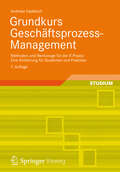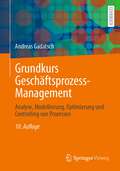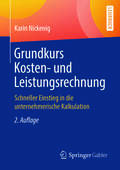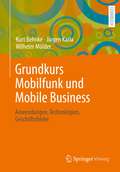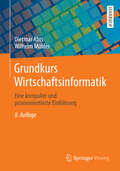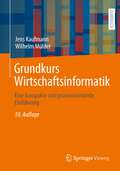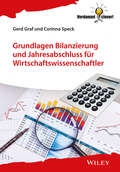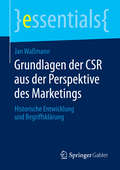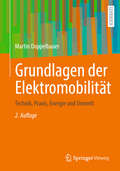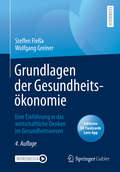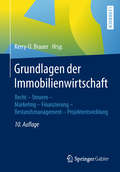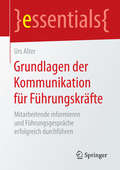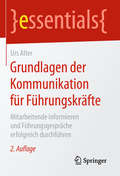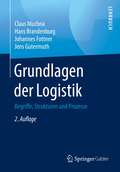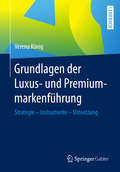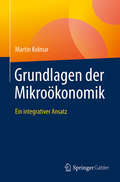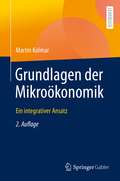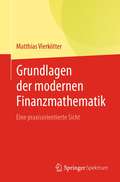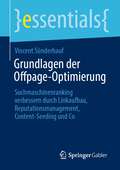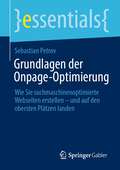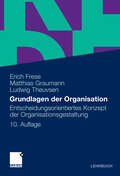- Table View
- List View
Grundkurs Geschäftsprozess-Management: Methoden und Werkzeuge für die IT-Praxis: Eine Einführung für Studenten und Praktiker
by Andreas GadatschOhne methodische Grundlagen gibt es keine erfolgreiche Gestaltung und Modellierung von Geschäftsprozessen unter Einsatz betrieblicher Standardsoftware, seien es ERP- oder Workflow-Management-Systeme. Das Buch schlägt die Brücke zwischen den betriebswirtschaftlich-organisatorischen Methoden und deren IT-gestützter Umsetzung. Ausgewählte Praxisbeispiele, Übungen u. v. m. vervollständigen das Werk. Das Buch von Prof. Gadatsch gilt mittlerweile als der "aktuelle Klassiker", DAS maßgebliche Standardwerk zur IT-gestützten Gestaltung von Geschäftsprozessen. Das Buch führt aus einer methodisch-organisatorischen Sicht in das Geschäftsprozessmanagement ein. Neben den rein organisatorischen Aspekten (Prozessanalyse, Prozessmodellierung, Simulation und Restrukturierung der Geschäftsprozesse) wird die technische Unterstützung mit Informationssystemen (ERP-Systeme, Workflow-Management-Systeme u.a.) thematisiert und anhand von Praxisbeispielen vermittelt. Das Werk wurde primär als Lehr- und Übungsbuch für Studenten konzipiert, wird aber auch gerne von Praktikern (Anwender, IT-Experten und Berater) zum „Wissensupdate“ eingesetzt. Einige Kapitel wurden in der 7. Auflage aus Platzgründen entfernt. Angesichts der stärkeren Verbreitung der BPMN-Methode wurde der Abschnitt stärker ausgebaut. Ein Vergleich ausgewählter Modellierungsmethoden erlaubt dem Leser eine Orientierung für den Fall, dass er eine für seinen Anwendungsfall passende Methode auswählen möchte.
Grundkurs Geschäftsprozess-Management: Analyse, Modellierung, Optimierung und Controlling von Prozessen
by Andreas GadatschDieses Lehrbuch schlägt die Brücke zwischen den betriebswirtschaftlich-organisatorischen Methoden und deren digitaler Umsetzung, denn Prozessmanagement heißt zunehmend Gestaltung betrieblicher Aufgaben. Neben methodischen Grundlagen bietet das Werk viele Praxisbeispiele und Übungen. Das Buch von Prof. Gadatsch gilt mittlerweile als der "aktuelle Klassiker", DAS maßgebliche Standardwerk zur IT-gestützten Gestaltung von Geschäftsprozessen.Die zehnte Auflage wurde überarbeitet und an die Anforderungen der Digitalen Transformation angepasst. Das Prozessmanagement hat sich durch den Trend der Digitalisierung und infolge der Pandemie stark weiterentwickelt. Ein weiterer damit verknüpfter Trend ist die verstärkte Nutzung von Data Science-Methoden für das Prozessmanagement, was auf wissenschaftlichen Konferenzen folgerichtig als "Process Science" bezeichnet wurde. Von besonderer Bedeutung sind auch jüngere Forschungsergebnisse, die unter dem Stichwort „Exploratives Prozessmanagement“ veröffentlicht wurden. Sie zeigen auf, dass die erste Hauptphase des Prozessmanagements eher auf die Optimierung bestehender Prozesse und Geschäftsmodelle ausgerichtet war. An verschiedenen Stellen des Buches wurden neue Praxisbeispiele aufgenommen, so zum Beispiel die Migrationsstrategien für das ERP-System „SAP S/4 HANA“, welches die Basis für viele Industrie- und Dienstleistungsprozesse darstellt. Das Kapitel zur Modellierung von Prozessen wurde aktualisiert und neuere Methoden wie z. B. Business Model Canvas aufgenommen.
Grundkurs Kosten- und Leistungsrechnung: Schneller Einstieg In Die Unternehmerische Kalkulation
by Karin NickenigDieser Schnelleinstieg in die komplexe Welt der Kostenrechnung unterstützt alle Nicht-Experten, die sich auf das komplexe System des internen Rechnungswesens einlassen wollen oder müssen. Die Kombination von theoretischen Grundlagen und einfachen Beispielen aus der Praxis ermöglicht Existenzgründern, Studierenden, Arbeitnehmern, Auszubildenden u. v. a. einen leichten, aber gleichzeitig fachlich fundierten Zugang zu dieser häufig schwer verständlichen, jedoch sehr spannenden Materie: So bildet die zukunftsorientierte Kosten- und Leistungsrechnung eine der relevantesten Säulen für den Unternehmenserfolg. Zahlreiche Erläuterungen, Beispiele und Übungsaufgaben führen Sie Schritt für Schritt in die Materie der Kostenarten-, Kostenträger- und Kostenstückrechnung ein und helfen Ihnen, diese Herausforderung souverän zu meistern und Ihr Unternehmen auf Erfolgskurs voranzubringen. Die vorliegende 2. Auflage würde gründlich durchgesehen.
Grundkurs Mobilfunk und Mobile Business: Anwendungen, Technologien, Geschäftsfelder
by Wilhelm Mülder Kurt Behnke Jürgen KarlaDas Buch eignet sich für Leserinnen und Leser, die eine aktuelle und kompakte Darstellung von Mobile Business benötigen. Gut verständlich und mit vielen Beispielen werden die wichtigsten strategischen, anwendungsbezogenen und technologischen Fragen zur Nutzung von Smartphone, iPhone, iPad und Co. im Unternehmen behandelt. Das Buch richtet sich an Studierende der Wirtschaftswissenschaften, BWL, Wirtschaftsinformatik und Informatik. Es kann sowohl in Bachelor- als auch in Masterstudiengängen genutzt werden. Anhand zahlreicher Fragen und Aufgaben eignet es sich auch zur Klausurvorbereitung und zum Selbststudium.
Grundkurs Wirtschaftsinformatik: Eine kompakte und praxisorientierte Einführung
by Dietmar Abts Wilhelm MülderMit unveränderter Dynamik etablieren sich neue IT- Anwendungsmöglichkeiten in unserer Gesellschaft. In Folge sind Unternehmen permanent gezwungen ihre bestehenden Informationssystem auf ihre Eignung, Aktualität und Wirtschaftlichkeit zu überprüfen. Daneben ermöglicht der technologische Fortschritt dabei auch immer wieder die Entwicklung völlig neuartiger IT-Systeme. Der „Grundkurs Wirtschaftsinformatik" beschreibt als Gesamtwerk der Wirtschaftsinformatik neben Hard- und Software-Lösungen auch deren praktische Anwendung und zeigt Wege in der Methodik und Organisation. Fallbeispiele, Übungsteile und Lösungen runden das Themenspektrum ab. Alle Kapitel wurden gründlich überarbeitet und didaktisch verbessert. Neu hinzu-gekommen sind Themen wie z.B. Software as a Service, Ruby on Rails, LTE, WiMAX, NoSQL-Datenbanken, Social Media, App-Stores und Green IT. Zwei neue Kapitel befassen sich ausführlich mit den aktuellen Trends „Mobile Business" und „Soziale Netzwerke". Durch zusätzliche Aufgabenund Wiederholungsfragen lässt sich das Buch noch besser als bisher zum Selbststudium und zu Klausurvorbereitung nutzen. Hinzu gekommen ist auch ein erweiterter Online-Service mit Klausuren und Musterlösungen.
Grundkurs Wirtschaftsinformatik: Eine kompakte und praxisorientierte Einführung
by Jens Kaufmann Wilhelm MülderIn diesem Lehrbuch erhalten Sie eine gut verständliche, praxisnahe Darstellung der gesamten Wirtschaftsinformatik. Dazu werden nach einer Einführung in die Grundbegriffe verschiedene digitale Geschäftsmodelle und ihre Umsetzung vorgestellt und es wird auf E-Business im Besonderen eingegangen. Im Bereich der Technologie werden Verfahren zur Datendarstellung und -verarbeitung erläutert und Hardware, Netzwerke und IT-Architekturen beschrieben. Die auf der Technologie basierenden Anwendungen umfassen Operative und Analytische Systeme sowie Datenbanken. Um Software zu entwickeln bzw. einzuführen, sind zudem Fragen der Organisation und Prozesse zu betrachten. Hierbei geht es um Projektmanagement, Software-Entwicklung und -Auswahl, IT-Management und IT-Sicherheitskonzepte. Praktische Anwendungsbeispiele, Fallstudien, Aufgaben und Musterlösungen erleichtern das Verständnis und ermöglichen Lernkontrolle bzw. Klausurvorbereitung.
Grundkurs Wirtschaftsmathematik: Pr�fungsrelevantes Wissen - Praxisnahe Aufgaben - Komplette L�sungswege
by Benjamin R. Auer Franz SeitzDas erste Buch zur Wirtschaftsmathematik mit kompletten Lösungswegen! Es umfasst in kompakter Weise das für ein Wirtschaftsstudium benötigte mathematische Grundwissen. Konzentriert und präzise werden die für das Grundstudium bedeutsamen Bereiche der Wirtschaftsmathematik vermittelt. Die "ausführlichen" Lösungswege machen den Stoff leicht verständlich und nachvollziehbar. D.h. über die schlichte Darstellung einer Lösung hinaus werden Ihnen auch die zum echten Verständnis der Materie notwendigen einzelnen Denkschritte gezeigt. So begreifen Sie die Funktionsweise und erfassen die Logik, die dahinter steht. Die zahlreichen Übungsaufgaben sichern Ihnen den Erfolg in der Klausur.
Grundlagen Bilanzierung und Jahresabschluss für Wirtschaftswissenschaftler (Verdammt clever!)
by Gerd Graf Corinna SpeckKompakt und »verdammt clever« auf den Punkt gebracht! Buchführung, Bilanz und Jahresabschluss – für viele Studierende ein notwendiges Übel auf dem Weg zum Abschluss. Die Aussicht auf die Prüfung kann einem schon mal die Laune vermiesen. Doch Sie haben die Lösung schon in der Hand: Die besondere didaktische Herangehensweise an diese Thematik vereinfacht Ihren Lernerfolg. Rätsel, Spiele und Lückentexte sorgen für gute Laune nicht nur bei BWLern und VWLern, sondern bei allen, die sich mit dieser Thematik beschäftigen wollen oder müssen. Grundlagen Bilanzierung und Jahresabschluss für Wirtschaftswissenschaftler behandelt alle Themen, die Studierende im Rahmen ihres Bachelorstudiums beherrschen müssen. Sie lernen spielerisch, wie von der Buchführung zur Bilanz übergeleitet wird und Sie lernen die einzelnen Bestandteile einesJahresabschlusses kennen: Bilanz, Gewinn- und Verlustrechnung, Anhang, Lagebericht, Kapitalflussrechnung und Eigenkapitalspiegel. Der schnelle Lernerfolg wird durch die Lernkontrolle (für alle Aufgaben sind die Lösungen in einem gesonderten Teil enthalten) sofort sichtbar und sorgt für beste Laune in der Vorlesung, WG, Mensa oder auf der Studentenparty. Dieses Lehrbuch ist auch für angehende Wirtschaftsinformatiker, -juristen, -ingenieure, -mathematiker, -pädagogen, -soziologen, -psychologen und andere Wirtschaftswissenschaftler geeignet. Viel Spaß beim Lernen! Grundlagen B
Grundlagen der Buchführung
by Alexander Burger Sabine Burger-StieberDieses Lehrbuch vermittelt eingängig die prüfungsrelevanten Grundlagen der Buchführung und des Jahresabschlusses unter besonderer Berücksichtigung der deutschen Rechnungslegungsvorschriften. Anhand praxisorientierter Beispiele erläutern die Autoren, was eine Bilanz ist und wie man sie erstellt, was erfolgswirksame Geschäftsvorfälle sind, wie sie gebucht werden und wie eine Gewinn- und Verlustrechnung gestaltet werden kann. Des Weiteren stellt das Buch bilanzpolitische Spielräume und ihre Nutzungsmöglichkeiten vor. Klausurrelevante Übungsaufgaben mit ausführlichen Musterlösungen finden sich am Ende jedes Kapitels. Ideal zur Prüfungsvorbereitung für Studierende der Betriebswirtschaftslehre und bestens geeignet für Unterricht und Prüfungsvorbereitung an Berufsschulen und den Industrie- und Handelskammern.
Grundlagen der Buchführung: Eine praxisorientierte Einführung mit Übungsaufgaben und Musterlösungen
by Alexander Burger Sabine Burger-StieberDieses Lehrbuch vermittelt eingängig die prüfungsrelevanten Grundlagen der Buchführung und des Jahresabschlusses unter besonderer Berücksichtigung der deutschen Rechnungslegungsvorschriften. Anhand praxisorientierter Beispiele erläutern die Autoren, was eine Bilanz ist und wie man sie erstellt, was erfolgswirksame Geschäftsvorfälle sind, wie sie gebucht werden und wie eine Gewinn- und Verlustrechnung gestaltet werden kann. Des Weiteren stellt das Buch bilanzpolitische Spielräume und ihre Nutzungsmöglichkeiten vor. Klausurrelevante Übungsaufgaben mit ausführlichen Musterlösungen finden sich am Ende jedes Kapitels. Ideal zur Prüfungsvorbereitung für Studierende der Betriebswirtschaftslehre und bestens geeignet für Unterricht und Prüfungsvorbereitung an Berufsschulen und den Industrie- und Handelskammern. Die aktualisierte 2. Auflage wurde gründlich überarbeitet, verbessert und um Ausführungen zu den GoBD ergänzt.
Grundlagen der CSR aus der Perspektive des Marketings: Historische Entwicklung und Begriffsklärung (essentials)
by Jan WaßmannDer Begriff der gesellschaftlichen Verantwortung von Unternehmen (Corporate Social Responsibility, kurz CSR) hat sich seit seiner frühen Konzeptionalisierung zu Beginn des 20. Jahrhunderts zu einem umfassenden Leitgedanken für Wirtschaft, Politik und Wissenschaft entwickelt. In einer historischen Betrachtung zeigt dieser Beitrag auf, wie sich die CSR von ihren Anfängen in den Managementtheorien von Barnard und Bowen bis zum heutigen Begriffsverständnis entwickelt hat. Zusätzlich wird eine Differenzierung der CSR in strategische und nichtstrategische Unternehmensaktivitäten vorgenommen. Dies ermöglicht es insbesondere dem Marketingmanagement, eine bessere Auswahl an CSR-Engagements zu treffen, die den gestiegenen Ansprüchen der Gesellschaft an die heutige Unternehmung nachkommen und gleichzeitig den Wert eines Unternehmens erhöhen.
Grundlagen der Elektromobilität: Technik, Praxis, Energie und Umwelt
by Martin DoppelbauerAusgehend von den Mobilitätsbedürfnissen der modernen Industriegesellschaft und den politischen Rahmenbedingungen zum Klimaschutz werden die unterschiedlichen Antriebs- und Ladekonzepte von batterieelektrischen- und hybridelektrischen Fahrzeugen vorgestellt und bewertet.
Grundlagen der Gesundheitsökonomie: Eine Einführung in das wirtschaftliche Denken im Gesundheitswesen
by Steffen Fleßa Wolfgang GreinerAuch wenn ressourcenbewusstes Handeln für Mitarbeiter im Gesundheitswesen schon immer selbstverständlich war, die Notwendigkeit einer Ausbildung in Ökonomik gelangte erst durch gesetzliche Sparmaßnahmen ins Bewusstsein. Das Lehrbuch bietet eine praxisnahe, umfassende und dabei kompakte Einführung in betriebs- und volkswirtschaftliche Zusammenhänge. So wird die Gesundheitsökonomik zu einem hilfreichen Instrument für Ärzte, Pflegekräfte und andere Mitarbeiter. Für die Neuauflage wurde die Darstellung der gesetzlichen Rahmenbedingungen aktualisiert.
Grundlagen der Immobilienwirtschaft: Recht - Steuern - Marketing - Finanzierung - Bestandsmanagement - Projektentwicklung
by Kerry-U. BrauerDieses renommierte Grundlagenlehrbuch macht auf anschauliche Weise mit dem gesamten Lebenszyklus einer Immobilie vertraut. Fundiert vermittelt es Studierenden und Lehrenden die für das stark expandierende Fachgebiet notwendigen ökonomischen, juristischen und steuerlichen Kenntnisse. Es eignet sich auch bestens als Nachschlagewerk für Dozenten sowie für Fach- und Führungskräfte in immobilienwirtschaftlichen Unternehmen.Die 10. Auflage wurde im Zuge der Baurechtsnovelle überarbeitet und aktualisiert. Die umfassenden Änderungen im Baurecht, die mit dem Gesetz zur Reform des Bauvertragsrechts und zur Änderung der kaufrechtlichen Mängelhaftung Anfang 2018 in Kraft getreten sind, wurden vollständig berücksichtigt. Auch die veränderten Regelungen aus dem Gesetz zur Modernisierung des Rechts der Umweltverträglichkeitsprüfung vom Juli 2017 sind eingeflossen sowie die Aktualisierungen in der Baunutzungsverordnung. Das bewährte methodische Konzept der Orientierung am Lebenszyklus der Immobilie wurde beibehalten.
Grundlagen der Kommunikation für Führungskräfte: Mitarbeitende informieren und Führungsgespräche erfolgreich durchführen (essentials)
by Urs AlterDr. Urs Alter zeigt auf, wie Führungskräfte im Bereich der Kommunikation am zeitsparendsten zu fundiertem Wissen kommen, das sie wirklich brauchen und anwenden können. Das Essential informiert schnell, unkompliziert und auf leicht verständliche Weise über alle jene Aspekte, die für Führungskräfte in der Kommunikation mit Mitarbeitenden wichtig sind. Im Zentrum des Praxisbezugs stehen dabei Informieren als Führungsaufgabe und das Vorgehen bei Gesprächen mit Mitarbeitenden.
Grundlagen der Kommunikation für Führungskräfte: Mitarbeitende informieren und Führungsgespräche erfolgreich durchführen (essentials)
by Urs AlterDr. Urs Alter zeigt auf, wie Führungskräfte im Bereich der Kommunikation am zeitsparendsten zu fundiertem Wissen kommen, das sie wirklich brauchen und anwenden können. Das Essential informiert schnell, unkompliziert und auf leicht verständliche Weise über alle jene Aspekte, die für Führungskräfte in der Kommunikation mit Mitarbeitenden wichtig sind. Im Zentrum des Praxisbezugs stehen dabei Informieren als Führungsaufgabe und das Vorgehen bei Gesprächen mit Mitarbeitenden.
Grundlagen der Künstlichen Intelligenz: Eine nichttechnische Einführung
by Tom TaulliKünstliche Intelligenz berührt fast jeden Teil Ihres Alltags. Auch wenn Sie auf den ersten Blick annehmen, dass Technologien wie intelligente Lautsprecher und digitale Assistenten das Ausmaß dieser Technologie darstellen, hat sich KI in der Tat schnell zu einer Allzwecktechnologie entwickelt, die in Branchen wie dem Transportwesen, dem Gesundheitswesen, den Finanzdienstleistungen und vielen mehr Einzug gehalten hat. In unserer modernen Zeit ist ein Verständnis von KI und ihren Möglichkeiten für Ihr Unternehmen unerlässlich für Wachstum und Erfolg.Artificial Intelligence Basics ist da, um Ihnen ein grundlegendes, zeitgemäßes Verständnis von KI und ihren Auswirkungen zu vermitteln. Der Autor Tom Taulli bietet eine ansprechende, nicht-technische Einführung in wichtige Konzepte wie maschinelles Lernen, Deep Learning, natürliche Sprachverarbeitung (NLP), Robotik und mehr. Taulli führt Sie nicht nur durch reale Fallstudien und praktische Implementierungsschritte, sondern nutzt sein Fachwissen auch, um auf die größeren Fragen einzugehen, die KI umgeben. Dazu gehören gesellschaftliche Trends, ethische Fragen und die zukünftigen Auswirkungen von KI auf Regierungen, Unternehmensstrukturen und das tägliche Leben.Google, Amazon, Facebook und ähnliche Tech-Giganten sind bei weitem nicht die einzigen Unternehmen, auf die künstliche Intelligenz eine unglaublich bedeutende Auswirkung hat - und weiterhin haben wird. KI ist die Gegenwart und die Zukunft Ihres Unternehmens und Ihres Privatlebens. Die Vertiefung Ihrer Kenntnisse in diesem Bereich ist von unschätzbarem Wert für Ihre Vorbereitung auf die Zukunft der Technik, und "Grundlagen der künstlichen Intelligenz" ist der unverzichtbare Leitfaden, nach dem Sie gesucht haben.Was Sie lernen werden· Studium der Grundprinzipien für KI-Ansätze wie maschinelles Lernen, Deep Learning und NLP (Natural Language Processing)· Entdecken Sie die besten Praktiken zur erfolgreichen Implementierung von KI anhand von Fallstudien wie Uber, Facebook, Waymo, UiPath und Stitch Fix· Verstehen Sie, wie KI-Funktionen für Roboter das Geschäft verbessern können· Einsatz von Chatbots und Robotic Processing Automation (RPA) zur Kosteneinsparung und Verbesserung des Kundendienstes· Vermeiden Sie kostspielige Stolpersteine· Erkennen von ethischen Bedenken und anderen Risikofaktoren beim Einsatz künstlicher Intelligenz· Untersuchen Sie langanhaltende Trends und wie sie sich auf Ihr Unternehmen auswirken könnenFür wen dieses Buch bestimmt istLeser ohne technischen Hintergrund, z. B. Manager, die KI verstehen und Lösungen bewerten wollen
Grundlagen der Logistik: Begriffe, Strukturen und Prozesse
by Claus Muchna Hans Brandenburg Johannes Fottner Jens GutermuthDieses Buch nimmt eine grundlegende Einführung in die Logistik und eine Einordnung der Logistik in den Wertschöpfungsprozess vor. Dabei wird auch der Frage nachgegangen, in welcher Beziehung Logistik(management) und Supply Chain Management stehen. Neben Begriffen und Strukturen in der Logistik werden auch Prozessaspekte behandelt. Ziel ist es, in kompakter Form das moderne Logistikverständnis, das über die reine physische Abwicklung von Gütertransporten, Umschlag und Lagerung hinausgeht, aufzuzeigen. Logistik wird dabei sowohl aus der Sicht einer Managementkonzeption als auch aus der Sicht der technischen Dimensionen behandelt. Jedes Kapitel enthält Lernziele sowie zahlreiche Übungsaufgaben mit ausführlichen Lösungen zum Selbststudium und zur optimalen Prüfungsvorbereitung.
Grundlagen der Luxus- und Premiummarkenführung
by Verena KönigDieses Buch geht der Frage nach: Was ist der Unterschied zwischen einer Luxusmarke und einer Premiummarke? Verena König erklärt erstmals die unterschiedlichen Markenprinzipien von Luxus- und Premiummarken an Hand ihres DIVA-Konzepts für Luxusmarken und ihres STAR-Konzepts für Premiummarken. Dabei geht sie auf die Besonderheiten der strategischen und der operativen Führung von Luxus- und Premiummarken ein. Zur Unterstützung gibt sie zahlreiche Tipps, wie man eine Luxusmarke oder eine Premiummarke aufbauen kann. Zur Veranschaulichung tragen verschiedene Fallbeispiele (z. B. Farrow & Ball, DURAVIT, Rolex, Land Rover) bei.Der Inhalt- Strategische Grundlagen und Positionierung- Produktmanagement- Preismanagement- Online- und Offline-Vertrieb und Verkaufsförderung- Kommunikation (Werbung, PR, Event Management, Social Media)- Controlling
Grundlagen der Mikroökonomik
by Martin KolmarDas Buch bietet eine in dieser Form einzigartige und gründliche Einführung in die Mikroökonomik. Die Ausgangsfrage lautet, warum und wie Menschen ökonomische Aktivitäten organisieren. Ausgehend hiervon wird dann eine institutionenökonomische Perspektive entwickelt, mit deren Hilfe die Möglichkeiten und Grenzen unterschiedlicher Typen von Märkten (Vollständige Konkurrenz und Externe Effekte, Monopol, Oligopol) zur Verringerung von Knappheit und zur Erreichung anderer Ziele untersucht werden. Das Buch umfasst traditionelle Modelle des Rationalverhaltens, integriert darüber hinaus aber auch Erkenntnisse der Verhaltensökonomik und der Psychologie auf systematische Weise. Der Ansatz des Buchs ist durch zwei Besonderheiten gekennzeichnet. Erstens entwickelt es einen integrativen Ansatz, welches die zentralen Ergebnisse der ökonomischen Forschung in einen grösseren Erkenntniszusammenhang einbettet. Dabei werden Folgerungen für die Gestaltung des Rechtssystems ebenso wie für die Entwicklung von Unternehmensstrategien systematisch entwickelt, und die Theorien werden einer kritischen philosophischen Reflexion unterzogen und mit Vorstellungen anderer Sozialwissenschaften verglichen. Zweitens legt das Buch einen Schwerpunkt auf kurze sowie umfassende Fallstudien, die ein Verständnis der Bedeutung der Theorien für unser Verständnis der Praxis erleichtern.
Grundlagen der Mikroökonomik: Ein integrativer Ansatz
by Martin KolmarDieses Lehrbuch bietet eine umfassende und einzigartige Einführung in die moderne Mikroökonomik. Es verfolgt einen integrativen Ansatz, indem es die wichtigsten Erkenntnisse der Ökonomik in einen breiteren Kontext stellt. Die Theorien werden aus philosophischer Sicht und durch den Vergleich mit Ansätzen aus anderen Sozialwissenschaften kritisch reflektiert und Implikationen für die Gestaltung des Rechtssystems und unternehmerisches Handeln erarbeitet. Das Buch richtet sich an Bachelorstudierende der Wirtschaftswissenschaften und anderer Fachrichtungen. Die zahlreichen kurzen Beispiele und umfassenden Fallstudien helfen dabei, die Anwendungen der Theorien zu verstehen. Daher eignet es sich für einen angewandten, aber dennoch fachlich präzisen Ansatz in der Lehre. Aufgrund der methodischen und philosophischen Einbettung eignet es sich auch für eine kritische Auseinandersetzung mit dem ökonomischen Mainstream. Ausgehend von der Frage, warum und wie Gesellschaften wirtschaftliches Handeln organisieren, werden die Möglichkeiten und Grenzen verschiedener Markttypen im Hinblick auf die Linderung von Knappheit und das Erreichen von Verteilungszielen aus einer institutionellen Perspektive analysiert. Die zweite Auflage erweitert die Entscheidungstheorie systematisch um Kapitel zur traditionellen Entscheidungstheorie unter Risiko und Unsicherheit und zur Verhaltensökonomie sowie um Erkenntnisse aus den Neurowissenschaften, der Evolutionspsychologie und der narrativen Psychologie zu menschlichem Verhalten. Zusätzlich gibt es theoretische Ergänzungen sowie aktualisierte Fallstudien und Beispiele - von Handelskriegen über Pandemien bis hin zur Klimakrise. Eine neue Ausgabe des begleitenden Arbeitsbuchs mit einer Fülle von Übungsaufgaben, die von einfachen Multiple-Choice-Fragen bis hin zu anspruchsvollen mathematischen Problemen und Fallstudien reichen samt Musterlösungen, ist separat erhältlich.
Grundlagen der modernen Finanzmathematik: Eine praxisorientierte Sicht
by Matthias VierkötterDieses kompakte Buch vermittelt übersichtlich, umfassend und gleichzeitig prägnant die stochastischen Grundlagen der modernen Finanzmathematik. Obwohl nur sehr wenige Grundkenntnisse vorausgesetzt werden, gewinnt der Leser trotzdem eine Vorstellung von den Hintergründen und komplexen Zusammenhängen der Finanzmathematik (insbesondere in stetiger Zeit). Aufbauend auf den Grundlagen der Stochastik werden klassische Modelle in der Finanzmathematik eingeführt sowie deren Stärken und Schwächen aufgezeigt. Darüber hinaus werden fortgeschrittene Zins- und Volatilitätsmodelle sowie mögliche Kalibrierungs- und Bootstrapping-Methoden zur Anwendung in der Praxis aufgezeigt. Abschließend werden die Auswirkungen der Finanzkrise 2007−2008 auf die Bewertung von Finanzinstrumenten und ganz aktuelle Fragestellungen wie OIS Discounting, Multi-Curve Bootstrapping, Valuation Adjustments, Margining und Auswirkungen der IBOR-Reform betrachtet.
Grundlagen der Offpage-Optimierung: Suchmaschinenranking verbessern durch Linkaufbau, Reputationsmanagement, Content-Seeding und Co (essentials)
by Vincent SünderhaufDieses essential beschreibt, wie Sie durch den Aufbau von Backlinks (Signale aus den sozialen Netzwerken oder gezieltes Reputationsmanagement jenseits der eigenen Websiteoptimierung) hohe Positionen bei Google & Co erreichen können. Offpage-Optimierung, auch oft Offsite-Optimierung genannt, bezeichnet alle Maßnahmen im Online-Marketing, die nicht die eigene Seite betreffen, sondern auf anderen Webseiten Einfluss auf das eigene Ranking nehmen. Der Autor gibt einen Einblick in die Mechanismen der Offpage-Optimierung und eine strukturierte Anleitung, wie Sie Ihr Ranking durch gezielte Maßnahmen verbessern können. Eine kompakte Einführung für kleine und mittelgroße Unternehmen, Einzelkämpfer, Gründer und Start-ups und alle, die ihre Webseite boosten wollen.
Grundlagen der Onpage-Optimierung: Wie Sie suchmaschinenoptimierte Webseiten erstellen – und auf den obersten Plätzen landen (essentials)
by Sebastian PetrovDieses Essential erklärt, wie Sie Ihre Webseite oder Ihren Onlineshop für die Top-Plätze der Suchmaschinen fit machen können – insbesondere beim Marktführer Google. Denn wenn Sie heute mit digitalen oder physischen Produkten oder auch Dienstleistungen in den Online-Verkauf einsteigen wollen, sind Sie auf gute Positionen in der organischen Suche angewiesen. Zudem gewinnen Sie nur mit einer attraktiven Seite und überzeugenden Inhalten das gute Bauchgefühl Ihrer Seitenbesucher und erzielen die gewünschten Conversions. Der Autor erläutert alle grundlegenden Regeln der Suchmaschinenoptimierung, welche Bedeutung der Algorithmus hat, wie eine fundierte Webseitenanalyse aussieht und alles Wissenswerte rund um Keywords und technische Aspekte.Eine kompakte Einführung für kleine und mittelgroße Unternehmen, Einzelkämpfer, Gründer und Start-ups und alle, die ihre Webseite boosten wollen.
Grundlagen der Organisation
by Ludwig Theuvsen Matthias Graumann Erich FreseDas bereits in neun Auflagen bewährte Standard-Lehrbuch der betriebswirtschaftlichen Organisationstheorie wurde vollständig aktualisiert. Die theoretisch geschlossene und gleichzeitig anwendungsorientierte Konzeption wurde beibehalten. Im Fokus steht die Zielsetzung einer methodisch fundierten Organisationsgestaltung, bei der die Autoren statische und dynamische Aspekte integrieren.
